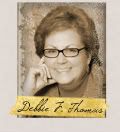
If you knew that you would never be published (or for those who have a book or so under their belts, never published again) would you continue to write? You should, because exercising that creative muscle would at that point be all about the process and not the boundaries, either real or imagined. I’m not talking about writing with ungodly abandon, but writing unfettered.
On a recent flight, I happened to pick up Southwest’s magazine and found the perfect example of writing unfettered. In October’s edition, Neil Gaiman’s short story Orange was featured, and I loved that his writing strayed outside the normal expectations of a salable story.
The opening lines are: ‘CONFIDENTIAL POLICE FILE’ and ‘(Third subject’s response to investigation’s written questionnaire).’ Then it lists the answers phrased so that you know the question without reading them. His treatment was so unconventional that I had the feeling he didn’t care about the ‘rules.’ He appeared to be having a ball.
So imagine there’s no one telling you this is the way it should be done, this is what sells. What elements of story can we address with the freshness that comes from writing for sheer enjoyment? Here’s a starter list:
- In whose perspective should the story be told? Consider all the possible characters who may have a fresh perspective and don’t just round up the usual suspects. It could be a very minor or surprising character with some tie-in before the end.
- What is the unique premise? Is the premise itself unique, or is it enough that the treatment be unique? Neil’s story has both.
- When does the story start? Try writing from the end forward or out of sequence, if disjointedness is a reflection on the protagonist.
- Why should we care about the characters? Is the quest truly life changing? Does it suggest danger or risk-taking, whether physical or through inner turmoil?
It’s true that Neil has earned the right to color outside the lines, and there is a definite trust factor established for him to produce a salable product that will delight his readers. But he didn’t get to that point by fettered writing.
Are there elements of your story that could use a fresh perspective? We’d love to hear from you.
 Several weeks ago Novel Matters held the Teeth and Bones Editing Contest - and Ellen was our
Several weeks ago Novel Matters held the Teeth and Bones Editing Contest - and Ellen was our 


















